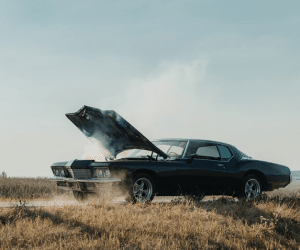
Classic car overheating can be a problem. If you’ve been around classic cars for any length of time, you know that they tend to overheat especially in these sizzling Texas summers. Given that at Wilson Auto Repair, we’ve been repairing classic cars for more than 30 years, we hear the complaint, “my classic car is overheating!” a lot.
We’ve written a few blog posts and Barry has recorded videos on this perennial topic. In this post, we’re going to round up and highlight that content to help you learn how to stop a classic car from overheating, so you can enjoy your excursions on the road rather than by the side of the road with your hood up.
What causes classic car overheating problems?
Old, classic cars are more prone to overheating than their modern counterparts due to several key reasons:
Cooling System Design: Many older vehicles were equipped with less efficient cooling systems than the ones modern cars have today. They often used smaller radiators, simpler water pumps, and lacked the advanced cooling technologies found in modern cars, such as electric fans and computer-controlled cooling systems. This can make it harder for them to dissipate heat effectively.
Thermal Efficiency: Older engines are generally less thermally efficient than modern engines. This means they convert a lower percentage of the fuel’s energy into useful work, with a higher percentage being wasted as heat. Managing this excess heat is more challenging, especially under demanding conditions like hot weather or prolonged idling.
Age and Maintenance: Over time, any vehicle’s cooling system can degrade. Components like the radiator can become clogged with rust and sediment, hoses can weaken and leak, and the water pump can fail. In classic cars, these issues are more likely due to their age unless they have been meticulously maintained or restored.
Lack of Overheating Protection: Modern cars are equipped with various sensors and computer systems that monitor engine temperature and can take corrective action (such as adjusting the air/fuel mixture or turning on electric cooling fans) before the engine reaches a critical temperature. Older cars rely more on mechanical systems without these real-time adjustments, making them more vulnerable to overheating.
Antifreeze/Coolant Evolution: The formulations of antifreeze and coolant have improved over the years, offering better heat transfer and cooling capabilities, along with corrosion protection for the engine’s internal components. Older vehicles might not benefit from these advancements if they are still using outdated coolant types or if the coolant has not been properly maintained.
Radiator Cap and System Pressurization: Modern cooling systems are pressurized, which raises the boiling point of the coolant and improves cooling efficiency. If an old car’s radiator cap is not maintaining the correct pressure, it can lower the system’s boiling point, leading to overheating.
Addressing overheating in classic cars often involves upgrading or properly maintaining the cooling system, including the radiator, water pump, hoses, and coolant. Ensuring the engine is tuned correctly and that the vehicle is using the appropriate type of coolant can also help manage overheating issues.
Related Articles:
- How to Prevent Classic Car Overheating
- How to Stop a Classic Car From Overheating
- Common Classic Car Engine Problems and How to Solve Them
Please consider subscribing to our monthly email newsletter to keep up with everything that’s going on at the Wilson Auto Repair garage. Also, follow us on Instagram, @carmechanic, and sign up for a LIVE, one-on-one Zoom consultation with Barry Wilson, our master mechanic to discuss any challenges you might be facing with your classic vehicle repair or restoration project. Finally, visit Wilson Auto.com, to find the tools we use and recommend to you for your classic car project.
